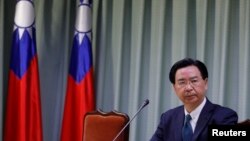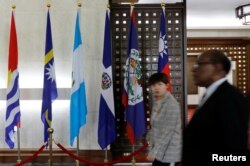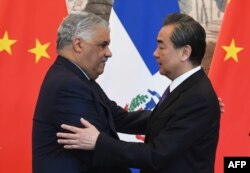The Dominican Republic severed ties with Taiwan and switched its allegiance to China on Tuesday, in another diplomatic blow to the self-ruled island, which accused the Caribbean nation of accepting false promises of aid from Beijing.
Taiwan, claimed by China as its own, has formal relations now with only 19 countries, many of them poor nations in Central America and the Pacific. China says Taiwan is simply a wayward province with no right to state-to-state ties.
China and Taiwan have tried to poach each other's allies over the years, often dangling generous aid packages in front of developing nations, though Taipei struggles to compete with an increasingly powerful China.
Panama ended its long-standing relationship with Taiwan last year in a major diplomatic victory for China.
China has stepped up the pressure on Taiwan since the 2016 election as president of Tsai Ing-wen from the pro-independence Democratic Progressive Party. Beijing fears she will push for Taiwan's formal independence, but Tsai says she wants to maintain the status quo.
The news on the Dominican Republic drew strong and swift condemnation from Taiwan Foreign Minister Joseph Wu, who told reporters that China had offered financial incentives to attract their support.
"President Danilo Medina of the Dominican Republic has ignored our long-term partnership, the wishes of the people of the Dominican Republic, and the years of development assistance provided by Taiwan, to accept false promises of investment and aid by China," Wu said.
Taiwan "strongly condemns China's objectionable decision to use dollar diplomacy to convert Taiwan's diplomatic allies.
Beijing's attempts at foreign policy have only served to drive a wedge between the people on both sides of the Taiwan Strait, erode mutual trust and further harm the feelings of the people of Taiwan," he added.
The Caribbean country had been a diplomatic ally of what is formally the Republic of China - Taiwan's official name - for 77 years, including when the government ruled all of China before being forced to Taiwan in 1949 after losing a civil war to the Communists.
Taiwan's presidential office said that despite the severe challenges, the government would not bow its head in pressure to Beijing, and vowed to do all it could to protect Taiwan's interests.
The Chinese government's top diplomat, State Councillor Wang Yi, lauded the decision, in comments to reporters in Beijing at a hastily arranged news conference.
"This important and correct decision by the Dominican Republic absolutely accords with the basic interests of the country and its people," Wang said. "We highly appreciate this."
Growth potential immense
The Dominican Republic said it had taken the decision after a long process of consultation, taking its needs and potential into account, according to a statement on the president's website.
It said that even without formal diplomatic ties, China was already its second largest supplier of imported products.
"Of course we know that now we're establishing diplomatic relations, the growth potential of our trade links is immense," presidential legal advisor Flavio Dario Espinal said.
Espinal said that the government was grateful to Taiwan.
"We are deeply grateful for the cooperation we've shared for years," he said. "However, history and the socioeconomic reality force us now to change direction."
In Taipei, Wu said China had failed to follow through on its promises to former Taiwan diplomatic allies, including $140 million in aid to the small West African country of Sao Tome and Principe in late 2016.
"Developing nations should be aware of the danger of falling into a debt trap when engaging with China," he said.
Neither Wang, nor Dominican Republic Foreign Minister Miguel Vargas Maldonado, who stood by his side at the Beijing news conference, took questions from reporters.
Speaking in March, Wang said it was in the best interests of Taiwan's few remaining diplomatic allies to recognize an "irresistible trend" and ditch Taipei in favor "one China" ruled by Beijing.
The Vatican is possibly next on the list, as the Holy See and China edge closer to an accord on the appointment of bishops in China.







